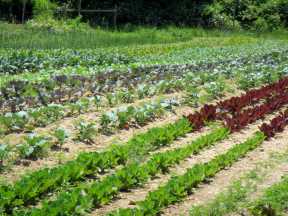
If you are like me and are concerned that our general food quality is rapidly declining, buy organic.
– Rachel Ezelius, R.D.
Going Organic: Hip or Hype?
by Rachel Ezelius, R.D.

Scientists estimate that we currently carry at least 700 contaminants in our body and that we are exposed to tens of thousands of chemicals every day. Some chemicals stay inside our bodies for only a short time before we naturally remove them through our bodies’ own detoxification processes: digestion/elimination, breathing, and sweating. But some pesky contaminants stick around. The chemicals that are not removed stay in our blood, fat tissues, muscles, bones, brain tissue, and other organs. Each individual has a unique removal process. Depending on how many of these contaminants are not removed, they may build up to dangerous levels and cause dysfunctions in the body. We see dysfunctions in the form of allergies, sensitivities, skin disorders, chronic fatigue, irritable bowel, memory changes, mercury poisoning, arthritis, hormonal imbalance, obesity, diabetes, anxiety, and the list goes on. Health experts would agree a nutritional approach to health is often more effective than conventional/medical treatments. This is where organics come in.
There are generally six food toxicities to discuss, GMO, hormones, pesticides, mercury, packaging, and preservatives.
Genetically Modified Organisms or GMOs entered US food supply in 1996. Without sounding like an alarmist GMOs are a cause for some concern. These foods have been scientifically enhanced or engineered by the insertion or deletion of genetic material in the organism’s original genome. The inserted genes may come from bacteria, viruses, insects, animals, or even human DNA. Much of the fresh produce we consume has been genetically altered to make it more resistant to pests and to increase its shelf life. There are no long term studies to determine the safety of these products. What’s concerning is that there appears to be a correlation between GMOs entering our food system and the rise in autoimmune disorders, food allergies, food sensitivities, cancers, chronic illnesses and nutritional deficiencies. Caution is therefore advisable when consuming these products.
Hormones are also added to food, especially in proteins such as dairy, beef, pork, lamb, veal, chicken and eggs. Growth hormones and genetically engineered hormones like rBGH have been given to animals to stimulate faster growth and increase milk production, Subsequently, we also ingest it and it may disrupt our own hormonal balance.
Pesticides include insecticides (chemicals that kill bugs), fungicides (kill mold), herbicides (kill plants), disinfectants and chemicals that kill bugs and rodents. They eventually enter the water supply and soil and work their way into the food chain. The grains we feed to animals (unless they are organically fed) are potentially full of pesticides and are then passed along to us when we eat the animals. Pesticides are fat-soluble and store in our fatty tissue, including our brain, which is why it is not surprising that there are several Parkinson’s correlation studies regarding pesticides.
Mercury is a by-product of fossil fuel usage. Waste from burning coal returns via rain to pollute our waters and fish. As a result, the consumption of certain fish is very likely to expose the consumer to mercury and other heavy metals. The government presently monitors contaminants, and right now the entire Atlantic coast and Gulf of Mexico are under a fish advisory.
Packaging of cans and boxes are often lined with plastics, among them BPA, which may leach into food and be related to a wide range of health issues. The highest level of BPA is found in plastic containers, caffeine-loaded energy drinks, canned soda and canned foods like diced tomatoes and soups. Consuming products that are packaged in plastic may also expose us to these potentially harmful chemicals.
Preservatives are chemicals that are often used to keep foods fresh for longer periods of time. They prevent mold or bacteria from growing by inhibiting their cellular function, which sounds great. But they may also interfere with our cellular function (such as slowing down our metabolism.)
If you are like me and are concerned that our general food quality is rapidly declining, buy organic. “Organic” is the official food-labeling term that denotes food products grown or raised under the authority of the Organic Food Production Act. Organic requires avoidance of pesticides, hormones, antibiotics and GMOs. It also requires that the product leave a smaller carbon footprint and be better for the environment overall. The benefits are enormous in more ways than science has even been able to confirm just yet. If bacteria, pests and molds are unwilling to eat my GMO, pesticide laden, chemical food why would I eat it?
If this interests you check out the message below from the Crop Share organized though Eat Smart. There may still be room for you to contact me at eatsmart@fitnessincentive.com. Also please attend the January, 2015 Eat Smart Clean Eating workshop that discusses the above in more detail and helps you to ‘detox’ after a long period of eating and drinking all of those holiday goodies.
Workshop Date: Thursday 1/1/15 at 10am, Saturday 1/3/15 at 10am and Tuesday 1/6/15 at 7pm
About Crop Sharing
written by Anthony Panarello owner and operator of Natural Earth Farms

My wife and I started natural Earth Farms in 2008. After years of looking for land to start farming organically, we stumbled upon an overgrown 10 acre field when while passing by an antique sale in an old 1850s post and beam barn that was 2 miles away from our home. We took a small loan out as soon as the owner agreed upon renting it to us and we got to work. The farm had lain fallow for 7 years, which was perfect for our venture. Now it has been six years farming the land, and things could not be better.
Operating an organic produce farm.
Many families these days are eating organic food. For some it is just a fad, but for others it is a way of life. There are many reasons why farming practices have evolved from natural method to the conventional techniques of today. Production, consistent quality, and pest control… the list can go on. To understand it well, here is a bit of an inside view…
The first and foremost component in organic growing is our soil. We spend countless time and money improving our soil, building organic matter, composting, adding trace minerals, and using cover crops to avoid soil erosion. Rotating crops helps control the depletion of nutrients and controls pest build up. Sometimes we have a picture perfect quality and sometimes, our produce is slightly imperfect, which is part of growing without the use of chemicals.
Every seedling coming out of our greenhouse and transplanted in our fields was started by us early in the season and hand planted by us and our crew of volunteers. Most of our weed control is by hand or tractor mounted cultivation tools. We handpick all of our produce on the day it goes out. We love our job and we are very hands on in the entire process.
Community Supported Agriculture (CSA)
Our CSA Program is the heartbeat of our farm. Starting in January each year, we start offering shares of our produce for the upcoming growing season. A certain number of shares are sold based on what we can produce. This helps us with working capital to start up the farm. In return the members are receiving a discounted rate opposed to the high cost of store bought produce, not to mention how fresh it is. Starting in mid-June and ending in mid-November, members will receive a box of produce each week to be picked up at one of our pick-up locations. We guarantee 6 to 9 items per week. You can enjoy a large variety of organic vegetables that will change with the seasons. However, as exciting as this may sound, it is not for everyone. If you like to try new veggies and enjoy preparing and cooking them, you are a good candidate. If you only like certain vegetables, you may find our online market or our farm stand would be a better fit for you.
You can read more about our farm, practices, and services we offer on our website, www.naturalearthfarmsny.com or like our facebook page.
Rachel Ezelius is a Registered Dietitian and the Owner/Operator of Fitness Incentive’s Eat Smart program.

